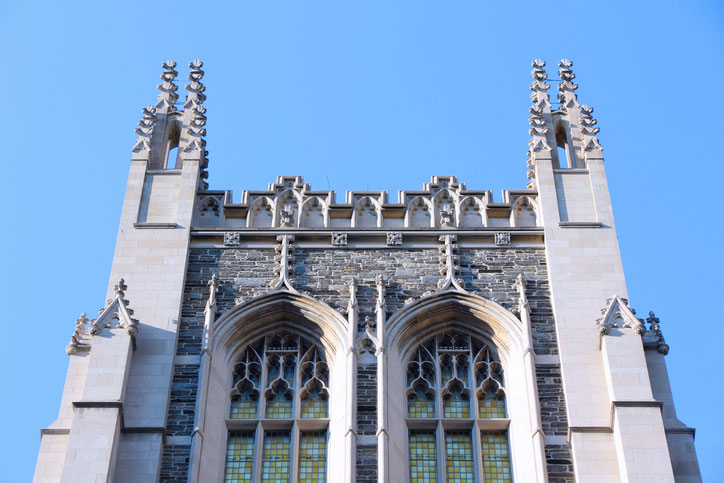
A seminary is a school for the study of theology and ministry. Most seminaries are primarily designed and used to train individuals who are called to become clergy through advanced degree programs, but they may offer any sort of religious education.
Seminary is just another term for a divinity school, but it has deep roots in describing places of religious education.
Education and knowledge are values that are blessed by Scripture.
Explore a Christian Ministry Degree – Request More Info Today!
For wisdom will enter your heart, and knowledge will be pleasant to your soul. Discretion will protect you, and understanding will guard you.
~ Proverbs 2:10-11
Almost as soon as there was an organized church, there were organized institutions dedicated to offering religious instruction. Clergy had to:
- Know how to read and write
- Be instructed in theological interpretation and church doctrine
- Learn liturgical processes and administration
In fact, the entire concept of higher education in the United States in general is owed to seminaries.
Harvard and Yale, two of the most revered universities in the country, were both originally founded as seminaries for the education of clergy. While both have gone on to offer many more kinds of majors than just divinity, both still incorporate divinity schools as well.
What Is a Theological Seminary? - The Difference Between Seminary and a Regular University
 Today, different denominations or organizations use the term seminary to describe different kinds of school.
Today, different denominations or organizations use the term seminary to describe different kinds of school.
In the Catholic church, a minor seminary is a secondary level school for ordinary students getting a religious education. Major seminaries are college-level schools that offer degrees at both the baccalaureate and advanced levels.
In most other denominations, a seminary school only refers to college-level schools.
Seminary schools are sometimes stand-alone universities, but they are also often integrated into larger religious universities as just one of a number of subordinate schools. While a university’s School of Business will award degrees in business and economics, the seminary will offer divinity and ministry degree programs.
What is the difference between seminary and divinity school?
The same two terms are often used interchangeably for these institutes of higher religious education. There are no real rules about which is which.
However, you will often find that divinity schools have a more ecumenical student body and curriculum. Seminaries may be more likely to be focused on training for a particular denomination.
What is a female seminary?
Since most seminaries today admit both male and female students, you won’t find this term used very often anymore. But once upon a time, when higher education was commonly segregated by sex, all-female seminaries were established around the country for the religious education of women.
These schools were almost entirely of the minor seminary type, offering a religious secondary education. Divinity degrees were not commonly offered. And although the instruction was still religiously-based, female seminaries were often known best for offering a range of liberal arts subjects to women. That was a contrast to the more vocational training that many women’s schools focused on at the time.
What Is Seminary School Education Like?
The main purpose of a seminary is still the education of clergy. So coursework revolves around the practical and theoretical basis of ministry:
- Pastoral care
- Bible studies
- Comparative and Christian theology
Seminaries also work to develop, both in formal coursework and in environment and activities, spiritual formation among their students. Mandatory daily prayer and worship services, direct counseling, mentorship for instructors, and reflective coursework all contribute to personal spiritual growth.
Almost all seminaries will offer a Master of Divinity (MDiv) degree. In some cases, that will be the only program they offer. In other cases, they might also have master’s or doctoral studies in ministry or pastoral studies as well.
The coursework can range from practical to highly theoretical. Many seminary students will be currently ordained ministers who are returning for more specific studies of an area of ministry where they want to improve. Their degrees are filled with advanced theological studies and in-depth explorations of the mysteries of spirituality.
But MDiv and other first professional degree students will spend plenty of time in practical, hands-on training. Internships or practicum courses put those students behind pulpits in actual community congregations, learning the craft from practicing pastors.
What Is a Seminary School Admissions Process Like?
Because seminaries are so focused, the admissions process to enter them is also different from most mainstream universities.
The basics are similar to any advanced degree program:
- Complete an application form
- Submit bachelor’s degree transcripts, often showing a specific minimum GPA
- Offer multiple letters of recommendation
- Submit a resume or curriculum vitae
- Complete a writing sample
- Submit an essay describing background and motivation
- In some cases, a GRE (Graduate Record Exam) or other college entrance exam score may be required
But seminary admissions go beyond the basics, too. You will often have to go through an interview or submit a specific statement articulating your personal religious views and experience. You may need letters of recommendation from your pastor, detailing your church attendance. Or you might need the endorsement of someone higher in the chain of authority in your church, approving your admission for the purpose of ordination.
Many seminaries have highly competitive admissions. Candidates have to do more than just check the boxes. Real initiative, motivation, and high-level recommendations will be required for entry.
What Is a Seminarian Supposed To Do With Their Degree?
 Almost all seminarians will graduate better trained for ministry work. The majority of graduates go on to become serving pastors. But becoming an ordained minister is not the only thing that you can do with a seminary education.
Almost all seminarians will graduate better trained for ministry work. The majority of graduates go on to become serving pastors. But becoming an ordained minister is not the only thing that you can do with a seminary education.
Many faith-based and non-profit organizations value the kind of training a seminary offers graduates. Many of the master’s degrees that come from seminaries are a year or more longer than secular master’s programs, which means more training and usually better practical skills.
The counseling, organizational, and ethical training seminarians receive are useful in all kinds of different management roles. Seminarians go on to run major charities or overseas aid organizations. Some start their own organizations, filling a need and answering a calling only they have heard.
What is a Jesuit seminarian?
Seminaries run by the Catholic Society of Jesus, or Jesuits, have long been renowned for their discipline, intellectual rigor, and quality of education. The order was founded by Ignatius of Loyola, and follows the Ignatian tradition even today: a strict, almost military approach to divinity education that offers a holistic approach to developing the whole person.
The value placed on education in the Ignatian model is such that Jesuits today operate the second highest number of schools of any Catholic order.









